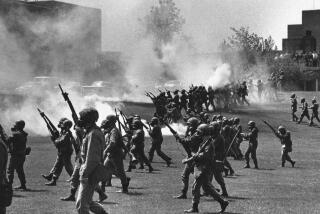A Massacre of the Spirit Torments China’s Campuses
- Share via
Only 100,000 carefully selected, screened and choreographed citizens adorned the enormity of Tian An Men Square on Oct. 1 to celebrate the 40th anniversary of the People’s Republic of China. This pales in comparison to the million or so who used to gather there spontaneously to take pride in the New China.
There was little reason to celebrate this year, especially for China’s students. Along with their teachers, they continue to bear the brunt of the government’s rage over last spring’s demonstrations. I have received more than two dozen letters in the last month from former students and colleagues at Beijing University, the hub of China’s pro-democracy movement, who wanted me to know that the massacre in Tian An Men Square is not over; it has simply been transformed into a massacre of the spirit.
The students of Beijing University (referred to as “Beida,” which, ironically, translates as “science and democracy”) have been targeted by the government for “special treatment” of an intellectual sort for the role they played in the pro-democracy movement. The government’s efforts to erase and reprogram the collective memory of the nation has taken an enormous psychological toll on Beida students.
One student described how she coped with the Tian An Men massacre: “After that terrible day, we all fled back to our hometowns. I seemed to suffer from a serious illness, which terrified my parents. I could not tolerate all the newspapers and television news programs which were contrary to what I knew. Gradually I learned that I had to try to avoid thinking about those days which easily plunged me into great sorrow.”
For some, the subsequent crackdown means an end to their life’s work. A junior faculty member wrote: “I, as a teacher who believed in democracy, took part in (the movement) actively. During this period, I wrote and published a series of articles about democracy, to tell the Chinese readers about democracy and what they should try to struggle for. But today, the crackdown on the democratic movement puts me in a difficult and dangerous position. . . . I have to stop my research work. As my major field is democratic theories and practices, if I continue to write and publish this kind of paper I will get into serious trouble.”
A second-year graduate student, attempting to leave for study abroad, eloquently summarizes the trauma: “It seems to be a trial, a trial to test the people’s patience, endurance and the ability to hope.”
For the hundreds who have been shipped off to the countryside to work on farms and in small factories, it means daily misery and suffering. A graduate student writes of the conditions faced by his fiancee on a distant farm: “She told me the condition there was so poor, her living expense was just 30 fen (about 7 cents) a day. I can hardly believe it. How can she live on food just worth 30 fen! There is no train to get there, so it is not easy to mail some food to her.”
The government’s assault on Beida students and faculty is harsh and systematic. Beida’s former president has been sacked and replaced by a hard-liner. The number of new students admitted to Beida was cut in half (to 800), but there aren’t any new students at Beida this fall anyway. The freshmen have all been shipped off to an army school in Hebei province for the entire year. When they return, none of the new students will be permitted to major in the social sciences. There are no new social-science graduate students or teachers either, since they led the democracy movement. To reduce the influx of Western ideas, the number of students permitted to study abroad has been sharply reduced, with special restrictions on study in the United States, Canada and Australia. Finally, to “re-educate” Beida students, all recent graduates are being sent to the countryside for two to three years.
The start of the academic year at Beida was postponed more than a month to stifle possible National Day protests. When classes resume next week, each student and teacher will be required to write a 5,000-word essay evaluating his or her thinking and behavior during the past year. We can only imagine what punishment will ensue in the absence of a “correct” response.
Thus the massacre continues, out of sight, but present in a most pernicious form of terror.
Beida students will not surrender easily to the government’s attempt to shatter their hopes and tame their spirit. A female graduate student says of the democratic movement, “It is just my dream! The very reason I am so interested in political science is that I dream of the day when democratic politics comes true in China.” A shred of hope is even shared by a recent undergraduate who has been sent to the fields instead of starting an assigned job at a university: “Yes, today in China democracy is really a dream that inspires so many people to devote themselves to its pursuit.”
Their courage is the most authentic inspiration of my lifetime. Promises, hopes and dreams will have to suffice in China for awhile longer. There is just no telling how long China’s students and teachers will cling to their faith in a new China. Time stands still now as the long-suffering Chinese wait patiently to start the movement of history again.
More to Read
Sign up for Essential California
The most important California stories and recommendations in your inbox every morning.
You may occasionally receive promotional content from the Los Angeles Times.













